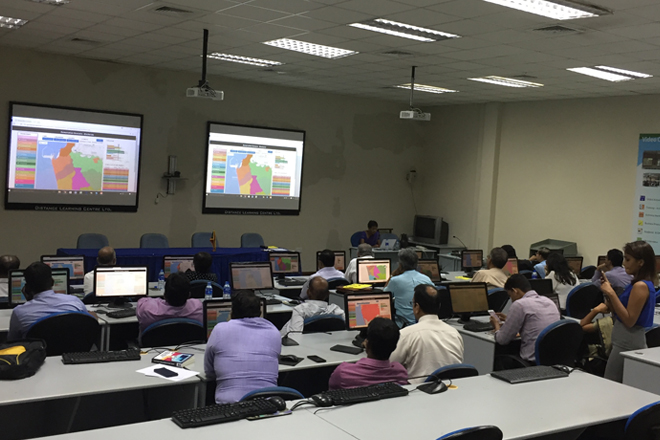online pharmacy cymbalta no prescription
The Delimitation Commission, a Constitutional body, is the authority responsible for demarcating electoral boundaries. The new online tool designed by LIRNEasia will allow citizens to participate knowledgeably in the re-demarcation process by developing their own demarcation scenarios and submitting them to the Delimitation Commission for consideration. Her Excellency Jennifer Hart, Chargé d'affaires, High Commission of Canada to Sri Lanka, Hon. Mano Ganesan, Minister for National Co-existence, Dialogue and Official Languages, and Mr. K Thavalingam, Chairman of the Delimitation Commission as well leaders of civil society organizations attended. The participants appreciated the functionality and policy relevance of the tool and provided useful feedback for improvement. The demarcations tool is the brainchild of LIRNEasia lead researcher Dr. Sujata Gamage, PhD MPA, who specializes in data analytics for public policy. Dr. Gamage has served previously in government as the Administrator for research programs at Ohio Board of Regents, USA, as consultant to the University Grants Commission of Sri Lanka, and as the Director General of the Tertiary and Vocational Commission of Sri Lanka. Since July 2016, Dr. Gamage has worked with the Forum of Minor Parties in Parliament to make informed interventions regarding proposed electoral reforms. Dr. Gamage's work focused on ‘what-if’ simulations of reforms, based on data from past elections. Her findings were published in popular media as well as academic journals. Subsequently, Dr. Gamage was appointed as an advisor on electoral reform to the Constitutional Assembly of the Parliament of Sri Lanka. LIRNEasia secured the detailed census data through the good office of Steering Committee of the Constitutional Assembly and developed the tool with a team of GIS experts. With this tool users can add or delete Grama Niladhari Divisions to or from proposed electorates. This creates a new distribution of electorates in the given district along with indicators of the resulting new population size and ethnic distribution in each new electorate. The project was funded by the International Development Research Centre of Canada. The responses of the legislators before and after the launch show that when stakeholders involve themselves knowledgeably, they become more trustful and conciliatory. A more systematic monitoring and evaluation is needed for more robust findings. Democratic processes in developing countries are often hampered by ethnic issues. An open and transparent process in electoral reforms can turn Sri Lanka into a beacon of good practice for the rest of Asia. LIRNEasia is catalyzing this movement by disseminating the tool for public use. log on to www.opendemarcations.lk to test the tool. Behind the tool: the background of electoral reform Electoral reforms were a key part of the constitutional changes promised by major Parties contesting both the Presidential Election in January 2015 and the General Election in August 2015. The basic promise was to do away with intra-party competition for votes, inherent in the present preferential voting system, and make MPs more accountable. As a first step, a Constitutional Assembly was set up to debate the issue. The recommendations currently on the agenda envision a mixed-member method with the total number of Members not exceeding 233. The preferential voting system to return MPs will be abolished. Two thirds of the Members will be returned first-past-the-post from 140 constituencies. The remaining 93 Members will be returned from closed Party List to make the final distribution of Political Parties in Parliament as close as possible to the proportion of votes received by each Party. The proposed method requires a re-demarcation of the present 22 electoral districts of Sri Lanka into 140 or fewer constituencies returning 140 MPs on a first-past-the-post basis. This change affects different political Parties in different ways. Small parties representing dispersed ethnic minorities are particularly wary. In larger electoral districts their candidates can collect votes across a district. Smaller Constituencies are seen as disadvantageous to the small Parties. But smaller constituencies electing one member per constituency are seen as key to doing away with intra-party competition and making MPs more accountable. Agreement on size and form of electoral districts is integral to enacting effective electoral reforms. Redistricting or demarcation is viewed as an opaque process that is possible only through a delimitation Commission established for the purpose. Transparency enables and strengthens trust and consensus. Sri Lanka recently enacted the right to information legislation. We are also a signatory to the Open Government Partnership – a concrete commitment to “promote transparency, empower citizens, and harness new technologies to strengthen governance,” among other things. The open demarcations data initiative by LIRNEasia brings these goals together.

